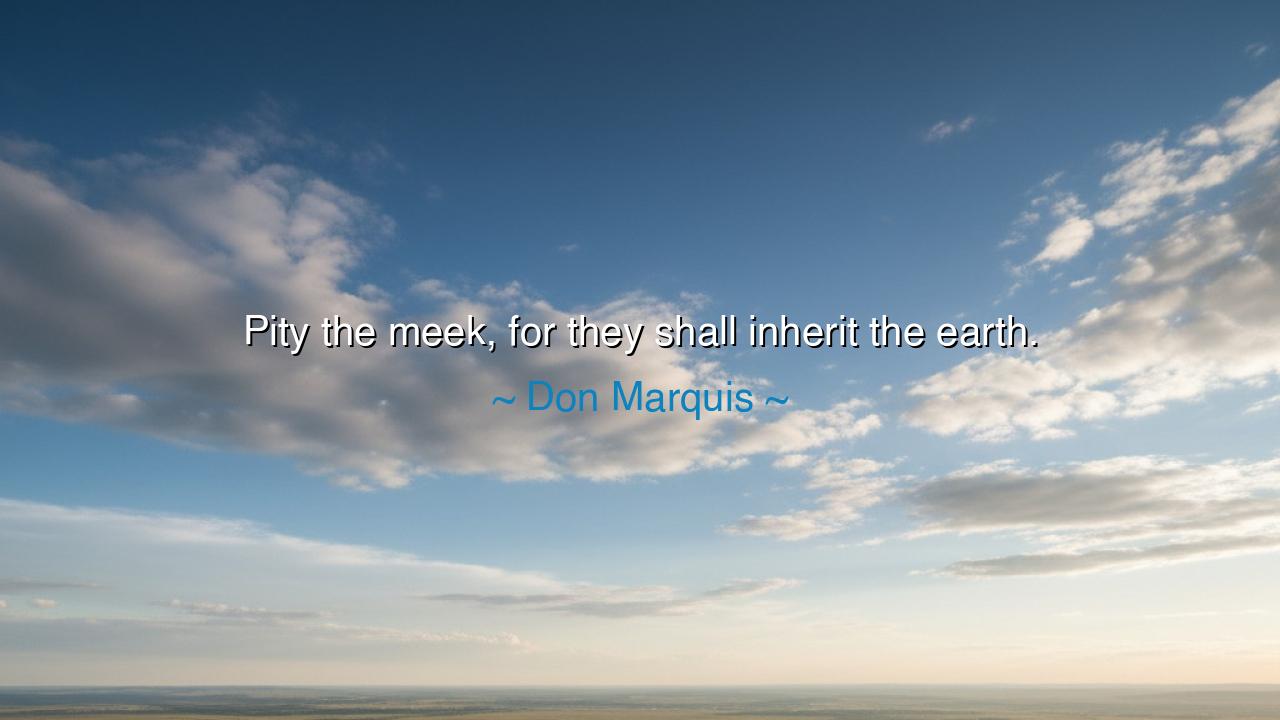
Pity the meek, for they shall inherit the earth.






"Pity the meek, for they shall inherit the earth." Thus wrote Don Marquis, the American poet and satirist, twisting the sacred words of Scripture into an ironic mirror of human nature. Where the Gospel of Matthew had once proclaimed a blessing—“Blessed are the meek, for they shall inherit the earth”—Marquis turns it into a lament, a warning, perhaps even a jest. His words are heavy with double meaning: are we to pity the meek because they inherit only burdens, or because in inheriting the earth, they inherit its sorrows, its labors, its ceaseless weight?
The ancients would have understood this irony. For they knew that every promise carries a shadow. To inherit the earth may sound like glory, but it also means inheriting toil, conflict, and responsibility. The meek, those who are quiet, yielding, and submissive, may indeed inherit the land—but what then? Shall they be prepared to rule it, to guard it, to carry its burdens? Marquis, with the sting of satire, invites us to question whether meekness is strength or weakness, whether inheritance without power is blessing or curse.
Consider the fall of the Roman Empire. When its strength was spent, when the legions no longer held the borders, the inheritance of that vast earth fell not to the strong, but to the weary and fragmented. The once-great provinces, meek and unprepared, suddenly bore the weight of governance and survival. Did they inherit a blessing? No—they inherited chaos, war, and ruin. Here Marquis’ words find form: pity the meek, for to inherit is not always to rejoice; it is also to suffer the weight of what the mighty have left behind.
And yet, the irony need not only be bitter. Perhaps Marquis also meant to remind us that in this world, the meek are too often crushed, too often overlooked, and when at last the world does fall into their hands, it may be too late. To say “pity them” is to highlight the cruelty of a system that favors the strong and cunning, leaving the gentle to pick up the pieces. His voice, though satirical, becomes prophetic: warning us that a world where the meek inherit only after devastation is a world where power was wielded unjustly.
But another reading is possible, one more heroic. Perhaps Marquis wished to awaken the meek themselves, to rouse them from their passivity. To tell them: if you shall inherit the earth, then you must be ready for it—ready to carry its burdens, ready to shape it anew. Pity not only their inheritance, but their unpreparedness, their failure to seize the strength that is required. In this way, his irony becomes a call to arms: to balance meekness with courage, humility with resolve, gentleness with endurance.
The lesson is thus twofold. First, that inheritance is never a gift free of burden. To inherit the earth is to inherit its conflicts, its wounds, its duties. And second, that meekness must not mean weakness. The gentle must learn strength, lest their inheritance become their undoing. To be meek in spirit is noble, but to be meek in action is dangerous, for the earth requires guardians who are humble yet strong, peaceable yet steadfast.
Practically, this means cultivating a balance in your own life. Do not be so meek that you are trampled, nor so proud that you trample others. Seek humility, but let it be coupled with resilience. Accept responsibility with courage, and do not flee from the burdens that fall into your hands. If you inherit leadership, bear it with justice; if you inherit hardship, endure it with dignity. In this way, you will not need to be pitied, for your meekness will be crowned with strength.
So pass down the paradox of Don Marquis: “Pity the meek, for they shall inherit the earth.” Teach it as both a warning and a challenge—that inheritance without readiness is sorrow, and meekness without strength is futility. But also teach that the true greatness of man lies in blending humility with courage, gentleness with resolve. For only then, when the earth is inherited, will it be a blessing and not a burden.






AAdministratorAdministrator
Welcome, honored guests. Please leave a comment, we will respond soon